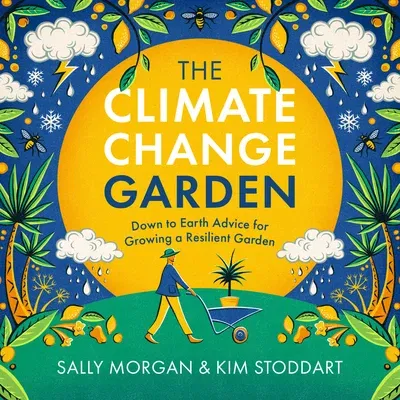In this global gardener's guide to creating a resilient, climate-wise
garden, learn how to adapt your garden to cope with volatile weather
extremes and other effects of a rapidly changing climate.
It's no longer gardening as usual. Heat waves, droughts, flooding,
violent storms...the long-predicted extremes of weather caused by
climate change are now on our doorstep, and gardeners around the world
are feeling the effects. Certain pests are staying active until much
later in the season, many plants are blooming earlier, soils are eroding
and degrading at a rapid pace, unpredictable rainfall is water-logging
our gardens, and fiercer storms are uprooting trees and snapping
branches. Not to mention the effects of prolonged drought in many parts
of the world and the water rationing that comes with it. What's a
gardener to do?
We need to learn how to protect the garden against climate extremes,
exotic pests, invasive weeds, and more. The Climate Change Garden is
the first book to reveal which types of gardens are better suited to
deal with such extremes and which techniques, practices, and
equipment can be put to good use in our gardens to help temper the
issues. There's no getting away from it; no matter where on the planet
you live, the climate and weather patterns are changing fast, and our
gardening practices need to catch up.
With the aim of building a more durable, robust, and productive
garden beneath the shadow of climate change, you'll learn how to:
- Adapt your plant selections, planting practices, and garden
maintenance techniques for the new future
- Select vegetable and fruit varieties that are more adaptable to
weather extremes and more capable of resisting pests and diseases
- Find ways to manage excess storm water runoff and minimize the heat
island effect
- Foster wildlife and discover the importance of creating a safe haven
for these creatures in a changing world
- Use season extenders like cold frames, high tunnels, and row covers to
protect edible plants from weather events
- Take measures to reduce your garden's carbon footprint, including
going no-till, building a green roof, and composting
- Limit the risks from wind, frost, and snow by taking advantage of
microclimates, planting wind breaks, and physically protecting plants
- Plant more of the right trees for your future climate to help cool
your home, slow the movement of water, and hold soil in place
The Climate Change Garden is about working with the natural world to
create a productive, low-maintenance, climate-savvy garden that's
capable of standing strong against the effects of a changing climate.

